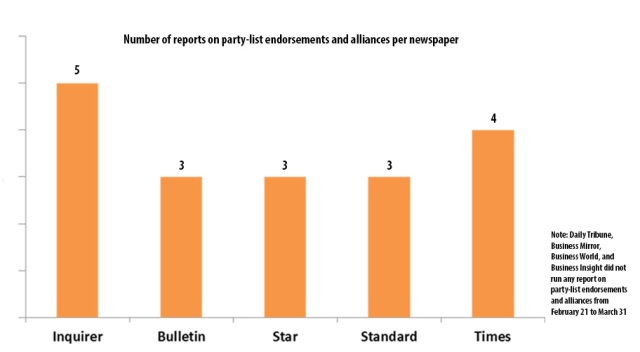Perverting the Party-List System
Another Good Thing Gone Bad

CMFR File Photo
THE PARTY-LIST system was institutionalized through Republic Act 7941 in 1995 to assure marginalized sectors of society of representation in Congress. The law uses the word “under-represented” to refer to these groups. Unlike other members of the House of Representatives, party-list nominees represent sectors instead of legislative districts. The nominees of party-list groups that obtain at least two percent of the total votes cast become members of the House and hold the same rights and privileges as their district counterparts. The system supposedly allows party-list representatives to participate in lawmaking so as to advance the interests and concerns of the sectors they represent.
However, the party-list system, which in essence should have democratized representation in Congress, has been severely compromised by politicians’ use of it to further strengthen their dominance in the legislature. Even before the start of the current campaign period, a number of party-list groups had already aligned themselves with, and endorsed, the candidates for local and national posts of established political formations. These groups claim common advocacies as the justification for their endorsements.
CMFR looked into the coverage of Manila-based newspapers (Philippine Daily Inquirer, Manila Bulletin, The Philippine Star, The Standard, The Manila Times, The Daily Tribune, Business World, Business Mirror and Malaya Business Insight) as well as selected primetime TV newscasts (TV Patrol, 24 Oras and Aksyon) from Feb. 21 to Mar. 31. CMFR found that there has been very minimal reporting on the party-list alliances and endorsements with other candidates.
Minimal, Sidelined
In print, there were only 18 reports on the party-list groups endorsements and alliances with established political parties. These reports were found only in five out of the nine monitored newspapers. The other four — three of which are business papers —have ignored the party-list issue in this election. The majority of these reports were published after the exodus of around 30 party-lists groups from the Koalisyon ng Daang Matuwid of the administration to the Partido Galing at Puso of Senators Grace Poe and Francis Escudero.
Figure 1. Reports on Party-list Endorsements and Alliances
Other reported alliances include Buhay Party-list’s endorsement of Vice President Jejomar Binay (“El Shaddai’sBuhay Party-list ‘endorses’ Binay”), Sanlakas party-list’s alliance with Senator Francis Escudero (“Sanlakas declares alliance with ChizEscudero”) and a party-list representative’s backing for Mayor Rodrigo Duterte (“Party-list rep, CDO lawmaker go for Duterte”)
These alliances were even less documented on TV. The three primetime newscasts ran only one report each, on the defection of 30 party-list groups from the administration to support Sen. Poe.
The reports merely noted how a party list groups’ endorsement, or lack of it, could affect a candidate’s chances. The articles did not draw out sources who are critical of these alliances, as these were more focused on the prospects of political candidates. The party-list groups were mentioned only in passing, the emphasis of the reports being on the senatorial and presidential candidates.
With exceptions, most of the media have been uncritical of these endorsements and the implication these connections have on the intent of the party-list system. The reports also failed to even mention the advocacies of the party-list groups, and why they’re endorsing the candidates and their political bloc.
Dynastic Power
The party-list system was meant to open Congress to underrepresented and marginalized sectors so they can participate in the legislative process, but it is now being used as a backdoor to Congress by traditional political groups and politicians, which have either established their own party-list groups, or are in alliance with already existing ones. The system is in effect strengthening the hold of dynasties on the legislative process.
In 2001, the Supreme Court ruled that the party-list system is exclusive to marginalized groups. This ruling was the basis for the disqualification of a number of party-list groups. In 2013, however, the High Court reversed its earlier ruling, stating that the party-list system should not be limited to marginalized and underrepresented sectors. Moreover, the Court ruled that the nominee of a party-list group need not be a member of the sector—for example, a nominee representing tricycle drivers need not be a tricycle driver himself—although he or she should at least have a track record of advocacy for the sector.
A Rappler report earlier cheered by CMFR (“Gaming the Party-List System”) was on the party-list groups that are taking advantage of the 2013 Supreme Court decision. The report looked into the dynasties and the re-electionist candidates in the party-list race, and found that a number of party-list nominees either belong to political families or are linked to incumbent officials. Former government officials were also gunning for congressional seats through the party-list groups they had organized.
ABS-CBN’s Failon Ngayon, in its March 5 episode, also reported that the nominees of some party-list groups are aligned with local politicians and dynasties. It mentioned Abono, which is linked to the Ortegas of La Union, and Alay Buhay, which is linked to the Gatchalians of Valenzuela. In the report, University of the Philippines professor Prospero de Vera pointed out that the party-list system has become an entry point for dynasties to place members of their families in Congress by creating party-list groups in their districts.
Some party-list groups are also expanding the political machinery of local and national candidates. For example, 1-AHAPO, composed of members of the Alpha Phi Omega fraternity (of which Vice President Binay is a member), actively campaigns for the vice president. The Partidong Bayan ang Bida, whose nominees were linked with the FPJ for President Movement, is a key player in the Poe campaign. Koalisyon ng Daang Matuwid spokesperson Barry Gutierrez is also the second nominee of Akbayan, an ally of the Liberal Party. These connections, however, have not been noted by the media.






Leave a Reply